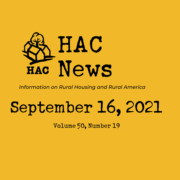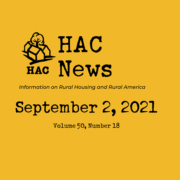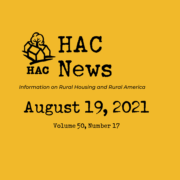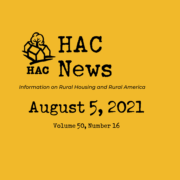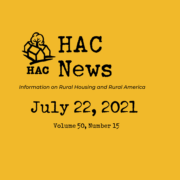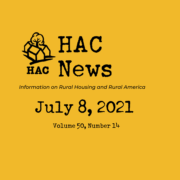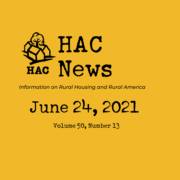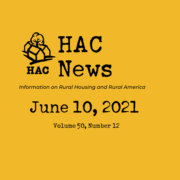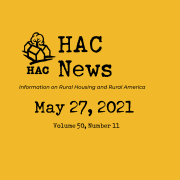HAC News: September 16, 2021
Vol. 50, No. 19
TOP STORIES
Fiscal year 2022 will start with a continuing resolution.
Congress has not passed any of the appropriations bills to fund the government for the new fiscal year, which begins on October 1, so a continuing resolution will be needed. Its length has not yet been determined. Information about the appropriations levels proposed for USDA and HUD is posted on HAC’s site.
House bill includes over $5 billion for rural housing.
Substantial funding for USDA and HUD housing programs would be provided in the $3.5 trillion budget reconciliation bill now being developed by House committees. The full reconciliation package, which covers social services not included in Congress’s bipartisan infrastructure bill, is expected to pass the House but its fate in the Senate is uncertain.
- On September 14 the Financial Services Committee passed its portion of the package, which includes funds for new construction, rehabilitation, and preservation of USDA-financed rental properties; Section 521 Rental Assistance; Section 502 direct loans; Section 504 repair grants, and Section 523 self-help housing. Details are posted on HAC’s site.
- HUD’s Self-Help Homeownership Opportunity Program (SHOP) would receive an additional $50 million over 10 years.
- The Agriculture Committee’s section of the package includes $3.87 billion over 10 years for a Rural Partnership Program to support rural development.
- The Low Income Housing Tax Credit would get an increased allocation each year from 2022 through 2028 under the Ways and Means Committee’s section. Tax credit basis boosts would be provided for some properties, including those in rural or Native American areas. The bill would make several other changes in the program as well.
Census Bureau calculations show aid reduced poverty in 2020.
The Census Bureau’s annual report on income and poverty shows that the official poverty rate rose from 10.4% in 2019 to 11.4% in 2020, the first increase after five consecutive annual declines. When the calculation includes stimulus payments, poverty fell from 11.8% in 2019 to 9.4% in 2020. Using that measurement, poverty in places outside metro areas fell from 11.6% in 2019 to 8.3%. U.S. median household income fell from $69,560 in 2019 to $67,521 in 2020, the first statistically significant decline in median household income since 2011. For places outside metro areas, changes in median income and the official poverty measurement were not statistically significant.
OCC proposes to withdraw CRA regulation.
The Office of the Comptroller of the Currency has issued a notice requesting comment on a proposal to withdraw its controversial 2020 Community Reinvestment Act regulation. The 2020 rule would remain in effect while the banking regulatory agencies develop a new CRA regulation, with a transition period while some aspects of the 2020 rule are replaced. Comments are due October 29. For more information, contact Emily Boyes, OCC, 202-649-5490.
Registration for virtual National Rural Housing Conference coming soon.
HAC’s National Rural Housing Conference is scheduled to take place virtually on November 30-December 3, 2021. With an exciting and full schedule of workshops and new virtual gathering spaces, the conference offers attendees a premier opportunity to learn from experts and connect with the entire affordable housing industry. Be on the lookout for a registration announcement. We look forward to connecting with you this December!
Last chance to nominate individuals or organizations for rural housing awards – deadline extended to Sept. 24!
As part of the 2021 National Rural Housing Conference, HAC will recognize individuals and/or organizations that have, through their continued work and/or newly established initiatives, made a positive and lasting impact in rural America. HAC invites nominations by September 24 of those who have made outstanding and enduring contribution to affordable housing in rural America. This year, HAC will consider each nomination on its own merits, relative to the specified contributions. More details and a list of potential categories are posted on HAC’s site. For more information, contact Miguel Guevara, HAC.
September 15 – October 15 is National Hispanic Heritage Month.
September is National Preparedness Month.
USDA Rural Development published a guide to RD programs and services that can help with disaster preparedness and recovery, and offers a webpage with information for RD customers.
RuralSTAT
There are nearly 20 million workers in rural America. Source: HAC tabulations of Bureau of Labor Statistics LAUS data.
OPPORTUNITIES
“Scaling down” webinar set for September 28.
HAC presents the second in a series of webinars designed to share innovative solutions for affordable housing developers dealing with escalating prices and implementing additional regulations. “Scaling Down” to Address Rising Costs will share pilot programs to reduce square footage and overall costs while increasing energy efficiency, including partnerships with Auburn University Rural Studio to design small, energy-efficient affordable homes.
Webinars offer training to help residents enroll in Child Tax Credit program.
Free webinars to inform housing and service providers who are helping residents claim the enhanced Child Tax Credit will be offered by the National Housing and Rehabilitation Association on September 24; by HUD on September 24; and by the White House and Treasury Department on September 20.
Survey asks for lessons learned since 2008.
The NHP Foundation, in collaboration with Enterprise Community Partners, invites affordable housing stakeholders to respond to a survey intended to produce a comprehensive look at what has been learned as a result of housing challenges from the Great Recession through the pandemic. The survey should take approximately 15 minutes to complete.
HAC seeks Community Facilities Housing Specialist.
The Community Facilities Housing Specialist identifies and engages community stakeholders and provides direct technical assistance to rural organizations that are developing facilities such as parks, community centers, public libraries and childcare centers. This includes helping them identify, utilize, and apply for financial resources such as USDA Community Facilities grants and loans. This is a two-year position and is eligible for telecommuting.
REGULATIONS AND FEDERAL AGENCIES
Input requested on Equitable Housing Finance Plans for Fannie Mae and Freddie Mac.
The Federal Housing Finance Agency is requiring Fannie Mae and Freddie Mac to develop Equitable Housing Finance Plans that will identify and address barriers to sustainable housing opportunities, including goals and action plans to advance equity in housing finance for the next three years. Public comments are due October 25 and FHFA will hold a public listening session on September 28.
HUD sets requirements for American Rescue Plan Act’s HOME funds.
Notice CPD-21-10 establishes requirements for the use of HOME-ARP funds, which must primarily benefit people experiencing homelessness, at risk of homelessness, or in other vulnerable populations. Several waivers and alternative requirements apply. The setaside for Community Housing Development Organizations is waived, but participating jurisdictions can use up to 5% of their grants to provide capacity-building operating assistance to CHDOs and other nonprofits. HUD also published several fact sheets related to this notice.
FY22 Difficult Development Areas and Qualified Census Tracts listed.
HUD’s annual lists of designations for use in the Low Income Housing Tax Credit program have been posted online. For more information, contact Michael K. Hollar, HUD, 202-402-5878.
FEMA widens disaster aid access, including for homeowners without standard titles.
Several changes to FEMA policies are intended to reduce underserved populations’ access to disaster aid. The agency broadened the list of documents that can be used to verify occupancy and ownership. It will allow disaster survivors with heirship properties, travel trailers, and the like to self-certify ownership. Also, assistance will be available for disaster-caused damages even if they did not make a home uninhabitable, and survivors who incur disaster-related disabilities will be eligible for aid to adapt their damaged homes.
Hazard mitigation regulations revised.
FEMA has revised its Hazard Mitigation Assistance and mitigation planning regulations to reflect current statutory authority and agency practice. These regulations cover the Flood Mitigation Assistance grant program, the Hazard Mitigation Grant Program, financial assistance for property acquisition and relocation of open space, and mitigation planning. For more information, contact Katherine Fox, FEMA, 202-646-1046.
USDA requests comments on broadband rules changes.
USDA’s Rural Utilities Service adopted regulatory changes to implement provisions of the 2018 Farm Bill relating to broadband programs, effective immediately. Comments are due November 9. For more information, contact Laurel Leverrier, RUS, 202-720-9556.
PUBLICATIONS AND MEDIA
News consortium plans to expand coverage of rural America.
The Institute for Nonprofit News hopes to uncover the most pressing issues confronting rural communities, with a focus on solutions. Over 50 INN news outlets prioritize coverage of rural communities and will form the basis of this two-year collaboration. The Daily Yonder and Investigate Midwest will serve as hubs for the project. For more information, contact INN.
USDA Community Facilities programs may have reduced pandemic’s impact.
Counties where USDA’s CF programs invested in health care facilities between 2016 and 2020 had lower COVID-19 case and death rates than other counties, regardless of rurality or poverty level, according to USDA’s Community Facilities Program May Help Rural America Cope with COVID-19, published in the magazine of the Agricultural & Applied Economics Association. The impact was strongest in remote counties.
Documentaries focusing on rural environmental justice to be shown across five states.
Working Films Rural Cinema, in collaboration with five nonprofit organizations across the country, is showing a total of 20 documentaries in rural communities in Georgia, Missouri, Montana, Pennsylvania, and Utah. These organizations intend to use the showings as a way to open a discussion about environmental topics.
Need capital for your affordable housing project?
HAC’s loan fund provides low interest rate loans to support single- and multifamily affordable housing projects for low-income rural residents throughout the U.S. and territories. Capital is available for all types of affordable and mixed-income housing projects, including preservation, new development, farmworker, senior and veteran housing. HAC loan funds can be used for pre-development, site acquisition, site development, construction/rehabilitation and permanent financing. Contact HAC’s loan fund staff at hacloanfund@ruralhome.org, 202-842-8600.
Please note: HAC is not able to offer loans to individuals or families. Borrowers must be nonprofit or for-profit organizations or government entities (including tribes).

